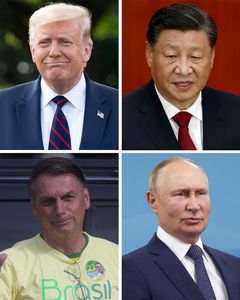For some time now pundits and commentators, including myself, have tended to argue that the defining feature of our era was the rise of the strongman—the figure who, by embodying populist nationalism in his country, had risen above the limitations and constraints of his political system to assert one-man rule, or at least dominance, of the land. This phenomenon had affected democracies as well as less democratic countries. While, in the latter case, autocrats like Russia’s Vladimir Putin and China’s Xi Jinping represented a familiar type of leader in their nations’ recent histories, democracies had simply never been headed by figures like the US’s Donald Trump, Turkey’s Recep Tayyip Erdogan, Brazil’s Jair Bolsonaro, Hungary’s Viktor Orban or even India’s Narendra Modi.
The power of these democratically elected strongmen rested on an ability to argue that they were more authentic representatives of their people than the rootless cosmopolitans they had displaced; and by articulating nationalism and cultural values, they dispensed, often ruthlessly, with traditional respect for minority rights, liberalism, dissent and the checks and balances on their power wielded by autonomous institutions in their nations. Their personalised style of governance gave rise to what has been dubbed the “cult of the strongman”—the tough, larger-than-life leader who brought liberal democracy to heel, and saw himself (and it was always a “he”) literally above the law, if not the incarnation of the law himself. Observing such leaders, Freedom House was moved to speak of a deepening “democratic recession”; Sweden’s famous V-Dem (Varieties of Democracy) Institute started describing such countries under strongmen rule as “electoral autocracies” rather than the democracies they had previously been classified as being.
The new strongmen were skilled at manipulating modern technology to wield outsize influence through social media (as well as the conventional press, radio and television) and also to wield the power of surveillance over the actions and beliefs of their citizens. Today’s strongmen are very much a 21st century phenomenon, a marriage of nationalist sentiment born of the insecurities generated by the current backlash against globalisation, with the technological progress made in recent years that can both make life easier for the many and make manipulation and control more feasible for the few.But recent developments in world politics make me wonder whether the fears expressed by the likes of me (and many others), that liberal democracy was now increasingly in peril around the world, wasn’t, after all, overblown.
The defeat this week in Brazil of strongman president Bolsonaro by the familiar leftist labour leader, former president “Lula” da Silva, is the latest manifestation of a seeming turnaround of the earlier trend favouring such autocrats. Just as American voters sent Trump packing in 2020, and the French electorate earlier this year gave Macron resounding support in his efforts to ward off his challengers on the populist-nationalist right, so also the Brazilians seem to be saying that the era of the strongman is, in fact, reversible. Yet—is it too early to breathe comfortably? Orban in Hungary and Erdogan in Turkey still look impregnable, and the less said about Modi in India, perhaps the better. The recent Communist Party Congress in China has consolidated Xi’s power as de-facto president for life, while the military setbacks of the Russian armed forces in Ukraine have barely dented Putin’s absolute invulnerability in Russia. And in the US, Trumpists in the Republican party seem poised to make sweeping gains in the mid-term elections due this coming Tuesday (November 8).
Some strongmen have fallen at their most recent hurdles, but it is possible to argue that there are still enough around the world for optimism to seem unwarranted. In his recent book on the phenomenon, Gideon Rachman identifies four characteristics common to the style of all strongmen rulers: the creation of a cult of personality, contempt for the rule of law, populist claims to represent the “real people” of their countries as opposed to the elites, and a politics driven by fear and nationalism. These are all, sadly, familiar elements in our own country’s recent politics. As long as they exist, alas, any complacency about our democracy, and the eclipse of strongman rule, cannot be justified.
editor@theweek.in


